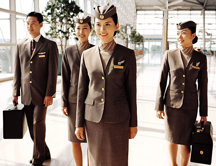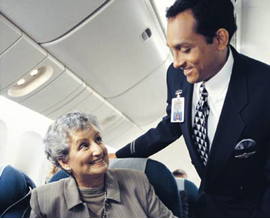English learning advice from Aviation English Asia.
A look at grammar and beyond to help flight attendants communicate with English-speaking passengers.
Written by Michael McBride
In this article, focussed on cabin crew English, we will examine language for making suggestions and advice to passengers on board. A flight attendant will be expected to have information about the origin and destination and to give information clearly and thoughtfully. We will look at grammar, examples, vocabulary and you will be able to practise with a visual scenario and a quiz at the end.
Giving advice – grammar for cabin crew
It is important to keep advice simple and clear. Modal verbs will be particularly useful.
- You should/must/have to + base of verb
- “You should visit the Tower of London.
However, be careful with the meaning. To offer a general suggestion use “should”, to be more emphatic (stronger emphasis) use “must” or “have to”. This is if you have a strong knowledge and experience of the place in question. Usually “must” and “have to” are used to talk about an obligation or necessity. “Must” and “have to” are slightly different – must is used to talk about an obligation where you have authority, whereas “have to” is use to talk about an obligation where the authority is coming from an external source, eg
- I must go home now I’m tired (it’s the speaker’s decision)
- I have to be at work at 8am (the obligation is from the employer)
You can use these phrases to exaggerate (make bigger) the importance of something, eg
- You must visit Harrod’s department store. It’s an essential destination for every visitor to London.
You can also use regular verbs to offer information.
- I recommend/suggest verb-ing
- “I suggest visiting the Empire State Building.”
These verb constructions possibly give more authority and formality, particularly with business passengers. Suggest andrecommend are again slightly different – recommend is only used when you have had personal experience of something.
Remember you will probably be busy and have other important tasks, so keep it simple and clear. To offer more information use the linker because plus it is + adjective/phrases.
- ….because it is beautiful and well known.
If you do have time, you could ask short closed questions to show interest with the passenger and to make them feel more comfortable.
- “Have you been before?” / “Is this your first time in x ?”
Other communication techniques
Giving advice to passengers after they have asked you a question requires a friendly, approachable attitude. Even if you are busy you need to show you are happy to speak to the passenger with good body language and posturing.
- If you have nothing in your hand keep hands open and if the passenger is seated try and make full eye contact. You may consider changing your posture, eg bending downwards so they are not looking directly up at you.
- Gesturing involves your hands while you speak. When giving information it shows more confidence if you keep hands apart and move them from time to time.
- When asking the passenger a question to show interest remember to use rising intonation towards the end of the question. “Do you go there often?”
Vocabulary for cabin crew – how to remember and what to remember
When learning any new vocabulary you need to learn in groups or categories, for example:
- Parts of the aircraft
- Food and drink
- Safety procedures
- Tourist information
Also you should be realistic, for every lesson or day of study, only expect to learn and remember 5 -10 new words. You must decide what is the most important for your job.
The topic of this article is about giving information to passengers, and in particular this includes tourist attractions, so that is one vocabulary group. Now consider word families:
- a tourist / tourism / tour
- a sightseer / sightseeing / sightsee
- explore / exploration / explorer (e.g. Christopher Columbus)
Which part of speech are the above words, eg verbs, nouns or adjectives? When you learn new vocabulary it is helpful to write (n), (adj) or (adv) after each word to help you remember how they should be used. In time you will be able to recognise patterns between words. Also study the English words for the major tourist attractions in the country/city you are flying to. If you fly to Europe, for example, equip yourself with a little bit of knowledge of the top 10 tourist attractions, for example: -
The Eiffel Tower, River Seine, Louvre (Paris)
Big Ben, Buckingham Palace, Trafalgar Square (London)
English for cabin crew – practice activity
Picture scenario
Now look at the picture below, imagine the passenger is asking the flight attendant for information about what to do in London.
- What questions do you think the passenger will ask?
- Work out the answers to the questions as a cabin crew member. (Remember, grammar, intonation and body language)
- What do you think will happen next?
Now study the picture and describe everything you see including: -
(a) What are the names of the objects?
(b) What expressions (use adjectives) can you see on their faces?
(c) What body language and gestures are being used?
What to do next
For feedback and more information about Aviation English Asia’s cabin crew courses please visit http://aviationenglish.com. We can help you improve your English whether you are an experienced pilot, a cadet entry pilot, a controller, engineer or flight attendant, with custom courses designed specifically for your needs. If you haven’t already please join the Aviation English mailing list for instant access to free demonstration units of the ICAO Aviation English Online course, special offers and details of courses in your area.



No comments:
Post a Comment